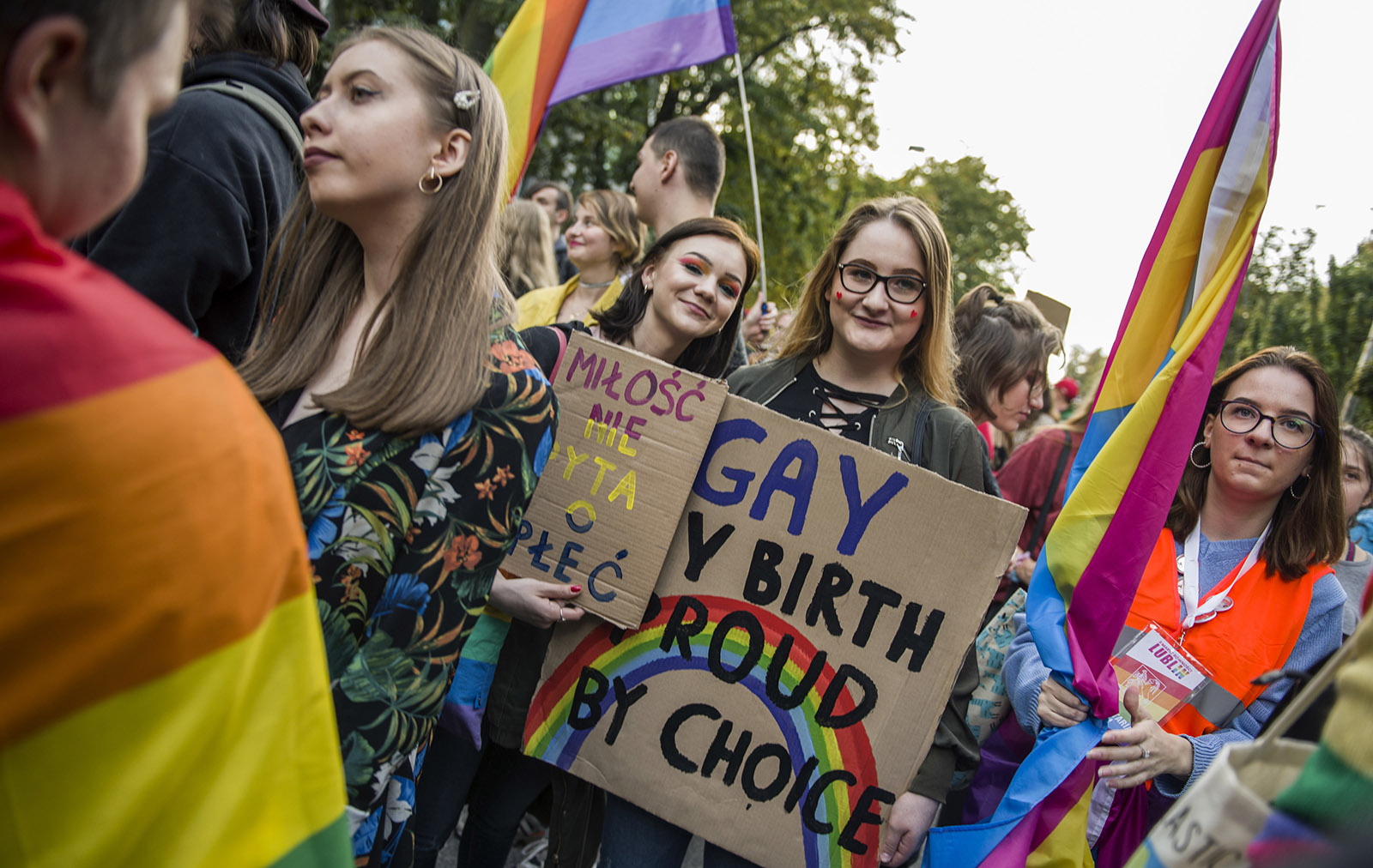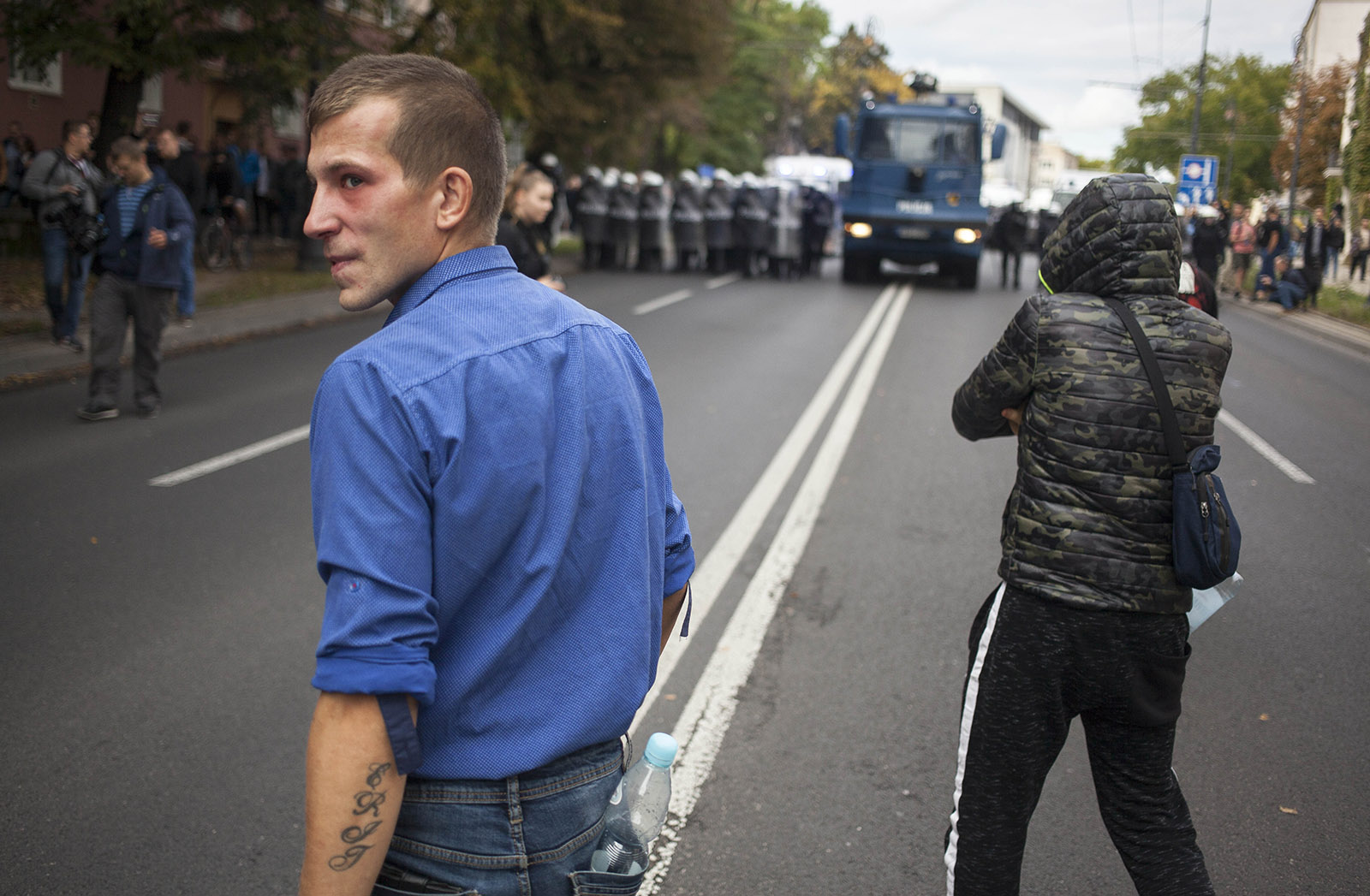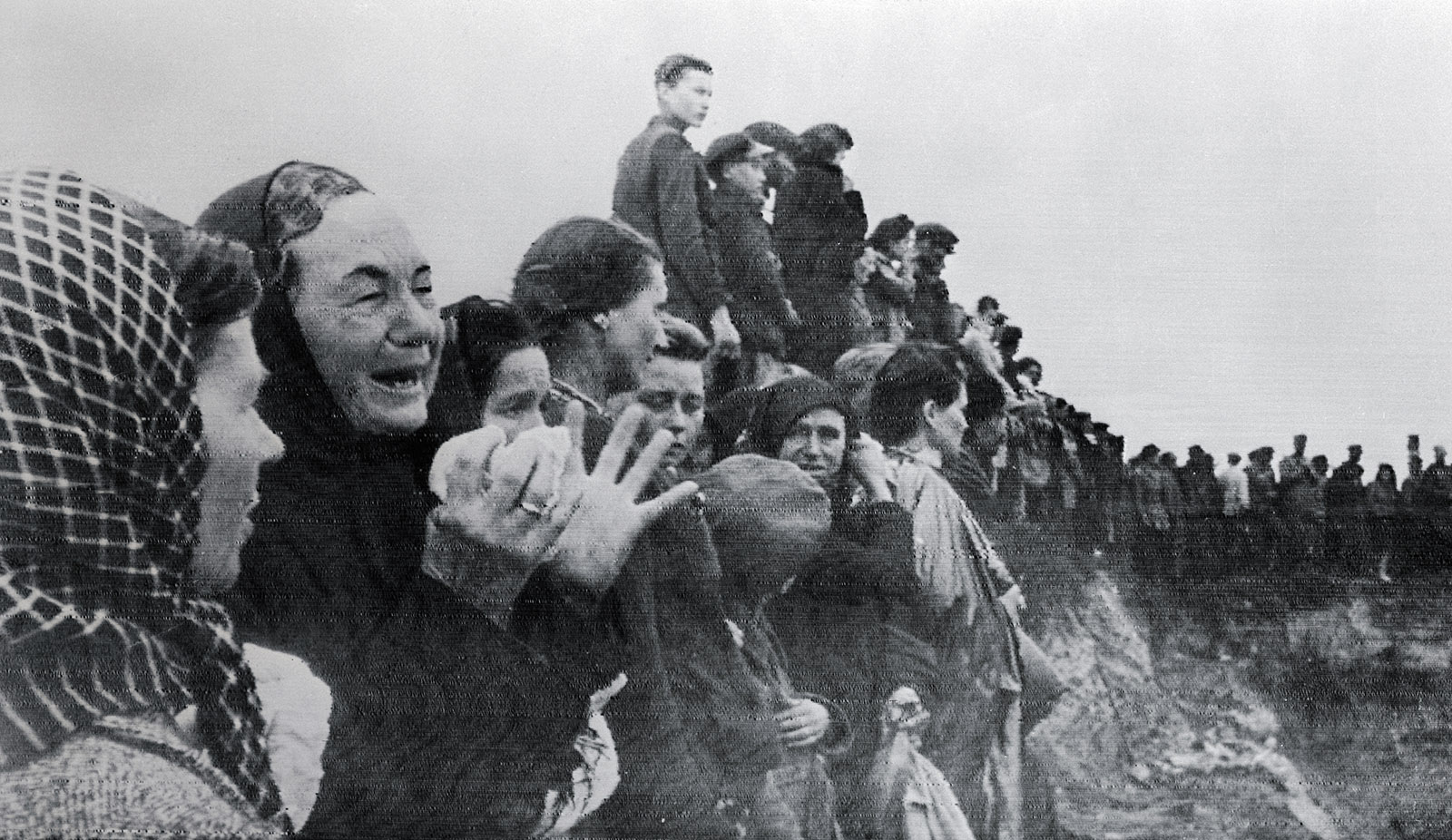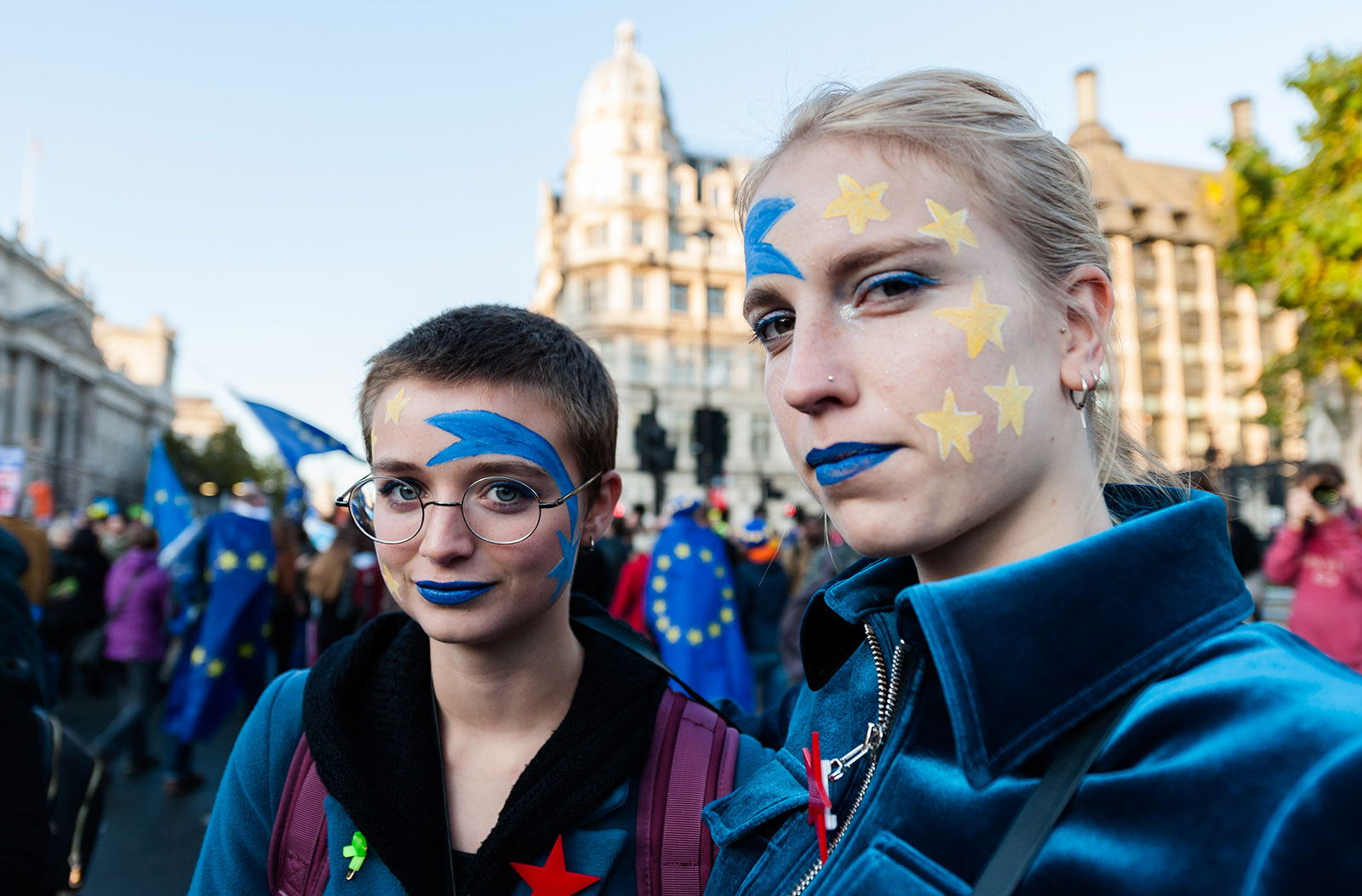The politics of identity—national and personal—have taken us along unexpected paths in the past few years. On a Sunday morning in mid-October, they took me a mile across a city on the south coast of England, to a community center where I cast my votes for Polish parliamentary candidates standing in Warsaw. Marking the “x” on each paper and dropping them into the ballot box, ambitiously large and symbolically transparent, I achieved a goal that had crystallized as I looked for answers to two questions that the 2016 Brexit referendum had thrust upon me: what it means to be European, and what it means to be part of a nation, however divided its people are.
Although I was born in England, my father was a Polish citizen at the time, which made me a Polish citizen, too. I had automatically lost that status in early childhood when my father was granted British citizenship, but I was able to reclaim it under current Polish law. With it came the right to vote: the capacity to act as a citizen, not just to be one.
Brexit had brought the importance of that realization home to me. While citizens of the United Kingdom had “European Union” emblazoned on their passports, their EU citizenship had been largely taken for granted or dismissed. Passively accepted rather than actively practiced, it was undervalued even by those who were pleased to have it—for the free movement across borders that it permitted, the automatic right to live and work in another European country that it conferred, and the sense that it created of being part of a larger European whole. Polish citizenship, however, is not something one takes for granted. It is a highly charged, demanding complex of history, duty, belonging, and conscience.
*
My first civic act as a Polish citizen, two weeks earlier, took place not at a polling station in an English city, but at an LGBT+ “Equality March” in Lublin, a city in eastern Poland. As we waited to move off, I found myself singing the Polish national anthem alongside a local member of parliament, surrounded by rainbow flags, wondering what my late father would be thinking if he could see me.
Would he be appalled by the equal rights movement’s challenge to traditional ideas about the family? Would he applaud the marchers’ assertion of democratic pluralism and the state’s formidable defense of these citizens’ right to free assembly? This latter aspect of the demonstration was quite a sight to see: a cordon of masked riot police, led by an armored vehicle with a water cannon to spray away the hooded anti-LGBT protesters who tried to block the route. Or would my father simply have been bemused, as indeed I was, by the bizarre turns that politics have taken lately?
The marchers’ keynote message was “Love, Equality, Acceptance,” which I think is one of the most beautiful chants I’ve ever heard on a demonstration. They reached out to onlookers by urging them to “come with us,” an implicit presumption of affinity with random strangers, and of the possibility that society as a whole could move from prejudice and phobia to shared understanding. Friendly gestures from people on balconies—including one older gentleman dancing to the march sound system, wearing only his underpants—supported the image that emerges from opinion surveys in Poland, of a society that has indeed moved toward acceptance, or at least tolerance, of its LGBT communities over the last decade. Polling also suggests, however, that many Poles share the views of Jarosław Kaczyński, the head of the national-conservative ruling party Law and Justice, who claimed earlier in the year that the LGBT movement is importing ideologies from Western Europe that threaten Polish identity, nationhood, and the state.
The marchers’ playing of the anthem as a curtain-raiser was a powerful symbolic retort to that view, asserting that minorities are fully a part of the nation, and no less for being minorities. I found myself in a minority at that moment, though. Although I sang along—the bits I know, at any rate—as did the parliamentary deputy next to me, not many others joined in. I dare say I wouldn’t have done either, if I had been as intensely exposed to narrow and intolerant visions of nationhood as they have, living in their homeland.
My patriotic feelings have been preserved by distance, so I still feel a pang and a thrill, in heart and spine, when I hear the Polish national anthem. (Even as a child, before my patriotic enthusiasms about Britain were dampened by prolonged familiarity, I felt let down by the gloomy dirge with which the United Kingdom had saddled itself.) But those sentiments have become more complicated, and more demanding. I could say a lot about patriotism, I remarked to the member of parliament, after the last chorus had finished. I said it apologetically, although there wasn’t really any need to apologize. It was just a hint of the underlying tensions between history, duty, belonging, and conscience.
Advertisement
The historic center of Lublin offers a variety of suggestions about how to be patriotic. A self-proclaimed “patriotic shop” in the old town offers souvenirs, T-shirts, and a range of items extending to patriotic air fresheners in the red and white of the Polish flag, all under the motto “For love of the Homeland”—or, to translate the word more faithfully to its spirit and etymology, the Fatherland. It stocks clothes from brands such as Red Is Bad and Ultrapatriot, promoting a version of nationhood that is overwhelmingly militaristic. In the patriotic retailers’ vision, Poland’s history is its combatants, their weapons and their insignia; from sabers to rifles, hussars in armor to fighter pilots; it is an epic tale of battles, risings, and resistance, with particular emphasis on the “cursed soldiers,” the doomed partisans who fought against the communist regime after the end of World War II. There is no postscript to say that all this is now over.
The message the government has for its people is that it is indeed not over, and that the nation must be constantly ready to defend itself. Lublin’s old town and its castle sit on twin small hills. On the morning of the Equality March, the low ground between them began to fill with soldiers belonging to the Territorial Defense Forces. This formation was established only in January 2017 but it claims to sustain the spirit and ethos of the Armia Krajowa, or AK, the wartime underground Home Army. The forces are intended to strengthen both the nation’s security and its patriotic values, seeking to embed the military in local communities, and to bind citizens into the historical narrative of combat to which the patriotic T-shirts attest.
The “cursed soldiers” are front and center in this picture. One of the Lublin regional brigades is named after a former AK officer who was executed in 1949 for his subsequent activities in the anti-communist resistance. A memorial to him and the men of his group stands at the side of the open space below the castle where the soldiers assembled. Civilians take photos of their partners and children in front of it.
As the territorials gathered for the parade, a column of soldiers wearing helmets and carrying assault rifles formed up on the other side of the bridge that links the old town and the castle. The troops lined the path beside another memorial to deaths during and after World War II. This one was temporary, an exhibit in Lublin’s Open City art festival, on the open ground between the castle and the old town where the city’s Jewish quarter used to be. Like the Equality March, it was a public intervention asserting that the nation must include its minorities and show that it cares about them. It took the form of a stack of wooden boards into which names were cut. The title was Judenfrei (Pyre 1): the explanatory tablet identified the names as those of places where Poles murdered their Jewish neighbors in pogroms, motivated by “hatred, avarice—the desire for easy profit, antisemitism.” In the years since the turn of the century, the stack of names has grown higher and higher, as documents are brought to light and silences broken.
The government, angrily defensive of Poland’s image abroad, tries to draw attention away from such historical crimes, and instead emphasizes non-Jewish Poles who risked and sometimes lost their lives trying to protect their Jewish neighbors from the Nazi occupiers. Red Is Bad has launched a line of T-shirts called “Poles Saving Jews”—written in English, evidently with an eye to Poland’s good name abroad—which, it says, highlights Polish “uniqueness.”
I’m far from indifferent myself about how Poland looks in the eyes of outsiders. I am provoked each time I see yet another media reference to “Polish death camps,” grotesquely misrepresenting what were Nazi death camps on occupied Polish territory. The worst thing about the phrase is not the slur it casts upon the nation, though, but the way it impedes the agonizing, unfinished effort to replace the cycle of accusation and denial with facts. It distorts the framework of historical understanding, and thereby frustrates the pursuit of a comprehensive truth. I believe in that pursuit and dread it at the same time: each new addition to the stack of names makes me fear that the truth of this history is even worse than I had hitherto realized.
Advertisement
Adam Michnik, the newspaper editor and former dissident who is detested as heartily by the current ruling party as he was by the communist regime, has argued that a sense of shame can be the basis of belonging to a nation: “He who is ashamed of Polish sins is a Pole.” This radical assertion makes conscience the foundation of identity, and patriotism is hollow without conscience, too. Patriotism often invokes honor; honor requires conscience; and conscience entails the possibility of shame. If the only permissible emotion is pride, then patriotism is merely chauvinism. Love for one’s country may be all the stronger for being troubled, and the country may be the stronger for that kind of love.
The “righteous among the nations,” Polish gentiles who worked to save Polish Jews, are honored in a fitting manner above the old town gate that used to overlook the Jewish quarter. Brama Grodzka, the Grodzka gate, has been transformed by the Teatr NN theatre company into a memorial building that is both an archive and an artwork, pivoting around its symbolic location as the point of contact between the city’s Jewish and Christian communities. It is a project many people find perplexing, as a panel on the center’s wall tells visitors:
Jews who come here ask us: Why do you do this? After all, you are not Jewish. You are Poles and the Jewish town is not your history. Poles ask us: Why do you do this? After all, you are Poles and the Jewish town is not our history. Or maybe you are Jewish? We explain patiently that it is our common, Polish-Jewish history.
The panel explains it in three languages: Polish, English, and Hebrew. Every time I read the text, I feel grateful to those people who have the patience to keep explaining that different groups can share a common history.
At the top of the building, moving from darkness up to light, the non-Jewish people who helped Jews are given their place. Names are listed, and one of the rescued Jews had the same name as me. I remarked on it to the guide. Maybe you’re related, he said. Knowing what I do of my family tree, I replied that this was very unlikely. Are you sure, he asked, in a tone that suggested I was denying the possibility of Jewish ancestry.
I seem to get questions like that more and more often these days, sometimes prompted by my surname and sometimes by my forename. People seem increasingly anxious to know where others are from.
*
Eastern Europe’s conservatives and nationalists offer clear advice about how to be European. The continent should be more like its eastern nations and less like its western ones, they maintain. It should reject multiculturalism, value homogeneity, and affirm its Christian foundations. They understand nationality in the Eastern European sense, meaning ethnicity rather than citizenship, and nations as ethnic groups around which states are constructed, rather than as entities produced by states. Their belief in the ethnic nation as the ultimate basis of sovereignty underlies their belief in a “Europe of the nations,” an association of sovereign states rather than a “United States of Europe.”
This is a familiar concept of identity, emotionally powerful and confidently asserted. EU citizenship, by contrast, is a construct of legal abstractions rather than an emotionally resonant expression of identity. It specifies certain things that citizens may do (most significantly, travel freely within the union and work in any of its member states), but those citizens do not constitute an imagined community. Whether Europeans will imagine one into being is yet to be seen.
One irony of Brexit is that Britain now has, in the words of the European Parliament’s lead Brexit negotiator, “the largest pro-European movement in the whole of Europe.” The Remainer marches that have recently filled streets in London certainly look like the beginning of a collectively imagined, popular vision of Europe. The numbers attending such demonstrations are difficult to assess and easy to exaggerate, but it’s reasonable to say that hundreds of thousands of people took part in each of the last three marches organized by the People’s Vote campaign for a second referendum —and the most recent one, in October, manifested what must surely have been the largest number of EU flags ever assembled on a single occasion.
First and foremost, though, the opposition to Brexit represents a vision of the United Kingdom rather than of Europe. Being part of an imagined European community would imply a sense of shared community with actual Europeans in other countries, and concern about the challenges facing Europe as a whole. But, even as the sense of European-ness seems to have grown as the movement has developed, it still feels confined to the island. Doubtless, the vast majority of anti-Brexit marchers in London would feel sympathy with the LGBT rights marchers in Lublin, and would deplore the hostility directed against them—but even those pro-European Britons would see them as victims of a strange and foreign political culture, rather than as fellow Europeans. It’s telling that “We Europeans”is not a familiar phrase in Remainer discourse. In their own way, Remainers are as inward-looking as Leavers. Endlessly deploring the likely effects of Brexit on Britain, they rarely voice much concern about what it may do to the EU and the European project. Being against Brexit is not the same as being for Europe.
Why the EU flags, then? They wouldn’t be needed if opposing Brexit was simply about material considerations such as impediments to travel or effects on GDP. Counterintuitively, perhaps, the flags are there to symbolize Remainers’ convictions about what sort of country they want to live in. The Remainer camp is a national movement asserting that Britain should be open, cosmopolitan, and co-operative in its disposition, internally as well as externally. It is about the character of the nation, and how that character should be built. The Remainers adopt EU flags to invoke corresponding “European” values. This is a gesture familiar from other European countries: Romanians waving them in protests against corruption, Poles carrying them on demonstrations against government measures seen as threats to democracy.
Those commonalities suggest at least the possibility of a shared and living history for Europeans of different nationalities. On the other side, though, there is the probability that the British will continue to be divided into two camps with fundamentally incompatible convictions about what kind of nation Britain is. Although Poles are strikingly united on the question of EU membership—support for remaining hit 91 percent in a survey earlier this year, against just 5 percent favoring a “Polexit”—they, too, are divided by fundamental antagonisms between conservative and broadly liberal visions of nationhood. We Europeans are united by our divisions.
Within such polarized societies, it’s hard to see a clear path toward reconciliation. Under the circumstances, an abstract patriotism might be the best form of mediation that we can manage. Given a limited de-escalation in the confrontation—perhaps along the lines of a formula such as “we’ll stop calling you idiots if you stop calling us traitors”—it could allow the two camps to live side by side, loving their shared nation in the abstract, if not the other half of the people that comprise it.






